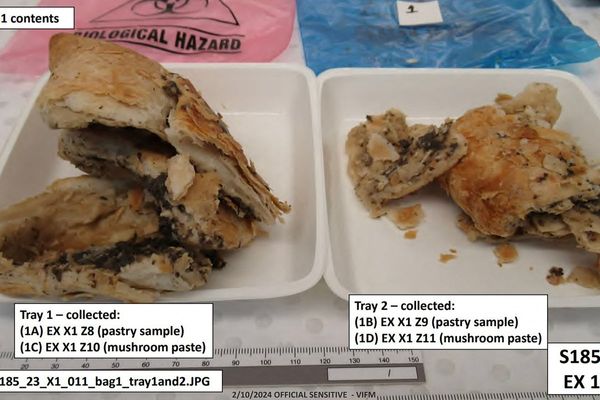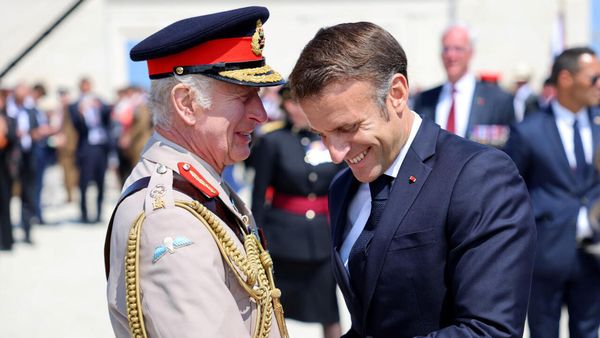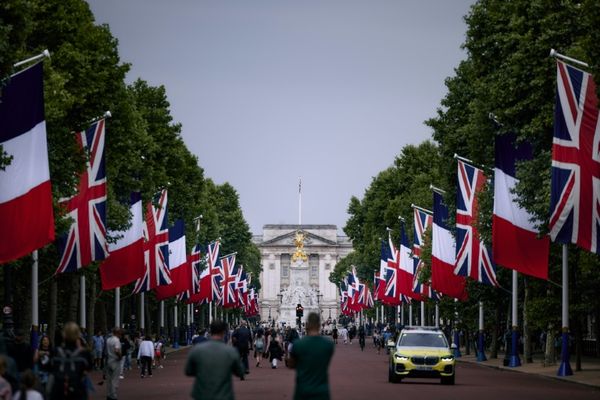
It’s often a bad sign when a major selling point for a show is the costumes. And there’s no getting away from the fact that in the Melbourne Theatre Company’s production of Shakespeare in Love, design is king (or, more fittingly perhaps, queen).
From the moment the lights come up on the set, this show is a sumptuous feast for the eye. An azure curtain sweeps up from stage left and across the flies, framing an Elizabethan fantasia of blue and gold that for the next two and half hours continually surprises and delights with its variations.
It would be utterly unsurprising if Gabriela Tylesova’s set upstaged everything else about this production. But fortunately, Simon Phillips’ production holds everything in balance: the design enhances the performances, while the actors bring the set to life. For all its excess, this show never feels overdressed.

This is the MTC’s major production for 2019, and it’s undoubtedly going to be a popular hit. Adapted by Lee Hall from the Oscar-winning romcom co-written by Marc Norman and Tom Stoppard, it works so well on stage that you wonder why it was a film in the first place.
Shakespeare in Love is a nonsensical fan fiction with a plot that stretches past implausibility to the absurd. None of its various writers pay much heed to historical accuracy, although its jokes draw from a solid knowledge of Shakespeare’s plays and Elizabethan England, with knowing winks at the present. As was the case at the time, the abiding genius of the London stage is a certain Kit Marlowe (Luke Arnold), who here functions as Shakespeare’s mentor: but we all know what happened later.
When we meet him, young Will (Michael Wahr) is struggling to write his new comedy, Romeo and Ethel the Pirate’s Daughter, which is overdue and has also been sold to two rival theatres, the Rose and the Curtain. A striking young man, Thomas Kent, auditions for the part of Romeo. Kent turns out to be a woman in drag, the stage-struck daughter of a rich merchant, Viola de Lesseps (Claire van der Boom).
As Will and Viola inevitably fall in love, he finds both his muse and his Romeo. Of course, their love is doomed – Viola is to be married to the impoverished aristocrat Lord Wessex (Daniel Frederiksen) and taken to his estates in Virginia. Not even Queen Elizabeth (played by a magnificent Deidre Rubenstein) can put asunder those whom God has joined. And so the comedy Romeo and Ethel the Pirate’s Daughter transforms into the tragedy of Romeo and Juliet.

Their clandestine affair is the lyric counterpoint to a series of comic subplots. There are the rival thespians Richard Burbage (Aaron Tsindos) and Ned Alleyn (Chris Ryan), who literally go to war over Shakespeare’s script. Meanwhile, the hapless theatre entrepreneur Henslowe (John Leary) is having problems with his investor Hugh Fennyman (Adam Murphy), who is dunning him for debts, and Lord Tilney (Francis Greenslade), the Master of Revels, who is threatening to close his theatre.
Much of the pleasure of this show derives from its ingenuity: the idea, for instance, of marrying the absurdity of Shakespeare’s comedies with the poignancy of his tragedies. It plays with the Elizabethan comic conventions of cross-dressing and mistaken identities, but in the end the wrong couple get married: Viola is whisked off to the New World by her brutish husband Wessex, and Shakespeare gets to write his famous plays.

Even in the midst of these comic shenanigans, I felt a tad incredulous that the lively, passionate Viola is so content to be sacrificed for Shakespeare’s brilliance. Her loss is the inspiration for his future plays, beginning with Twelfth Night. Lurking beneath this conceit is the convention of male genius, with all its boring sexist baggage. If the play features a young John Webster (played as a wicked imp by Aljin Abella), why not a junior Aphra Behn?
But it doesn’t do to prod too deeply. It’s all gorgeous surface, down to the picturesque poverty of the thespians, brilliantly rendered by its ensemble cast. Even the smallest parts enhance the enjoyment of the whole, including a dog called Spot, complete with Elizabethan collar, who generates one of the most groanworthy gags.
Strangely, even though it’s a faithful adaptation, the production reminded me more of Blackadder than it did of the original film: Chris Ryan’s swashbuckling Ned Alleyn, for instance, has more than a touch of Rik Myall’s Lord Flashheart. Perhaps Blackadder is more inherently theatrical than the movie. In any case, it’s a merry romp, most spectacularly attired. Just the thing to cheer a cold winter evening.
• Shakespeare in Love is showing at Arts Centre Melbourne until 14 August
• This article was amended on 22 July to correct the name of the actor playing Ned Alleyn







